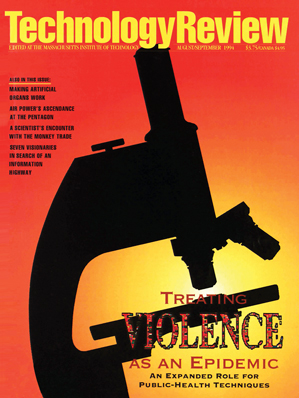The Internet as a Force for Equality
“Any vision of the information superhighway that focuses on video-on-demand and home shopping … is too narrow. The first-order issue ought to be: What are we shooting for as a society? How are we conceiving of this great project that we are engaged in? My hope is that we reach a consensus for the system to be open, inclusive, egalitarian, and decentralized, and that it be based in the private sector so that investments can be matched with the possibility of reward.

One of the things that’s gotten lost here is the notion of who we are as Americans. Our democratic tradition emphasizes the value of active participation in the shaping of one’s society. If we have an information infrastructure that is highly open and decentralized and egalitarian and supports diversity, and that lets lots of people make lots of money, then it will create numerous opportunities for types of civic participation that do not exist today. So the point is to tip the balance back in favor of those who do not have lots of money and lots of power by giving them more of an opportunity to have their voices heard—by each other, by their elected officials, by people in their community who may not share their views.
Let’s put this in historical perspective. In the first decade of the republic—when the United States was a start-up—it was Alexander Hamilton versus Thomas Jefferson for the dominant vision of what kind of government we were to have. Hamilton won, and we wound up with a highly centralized society. But now there’s an opportunity to have sort of a rematch, under very different conditions, between the principles of Jefferson and those of Hamilton. We have the ability, given the construction of a high-capacity information infrastructure, to do things in a decentralized fashion that does not require large institutions, either public or private.”
Excerpted from “Seven Thinkers in Search of the Information Highway,” from the August 1994 issue of Technology Review. The text above comes from Mitchell Kapor, chairman and cofounder of the Electronic Frontier Foundation and founder of Lotus Development.
Keep Reading
Most Popular
Large language models can do jaw-dropping things. But nobody knows exactly why.
And that's a problem. Figuring it out is one of the biggest scientific puzzles of our time and a crucial step towards controlling more powerful future models.
The problem with plug-in hybrids? Their drivers.
Plug-in hybrids are often sold as a transition to EVs, but new data from Europe shows we’re still underestimating the emissions they produce.
How scientists traced a mysterious covid case back to six toilets
When wastewater surveillance turns into a hunt for a single infected individual, the ethics get tricky.
Google DeepMind’s new generative model makes Super Mario–like games from scratch
Genie learns how to control games by watching hours and hours of video. It could help train next-gen robots too.
Stay connected
Get the latest updates from
MIT Technology Review
Discover special offers, top stories, upcoming events, and more.